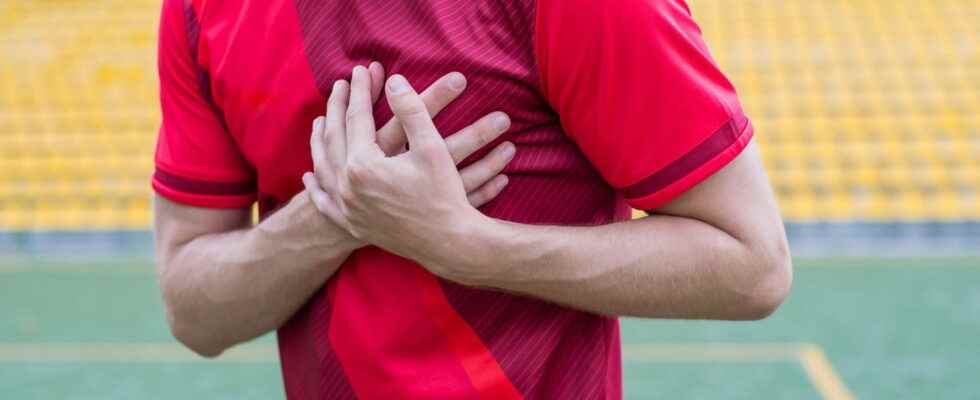We all have in mind the image of the football player who suddenly collapses on the pitch, in the middle of a match, victim of cardiac arrest. What are the causes of sudden athlete death? Young ? After 35 years?
Footballerrugby player, basketball player, swimmer… 2000 to 3000 top athletes suffer from cardiac arrest each year in France on a total of 50,000 stops. 500 die according to French Federation of Cardiology, sometimes in front of the cameras. the June 12, 2021, the danish player Christian Eriksen suffers from a heart attack during the Euro of football. He collapses in the middle of a match and is evacuated on a stretcher. He will wake up a few hours later in the hospital, saved. Cardiac arrest can happen in men as in the women. His causes nevertheless differ according to the athlete’s age. Explanations with Pr Jacques Mansourati, cardiologist and rhythmologist, member of the French Federation of Cardiology.
What is Sudden Athlete Death?
The “sudden death of the athlete” designates the sudden death of a top athlete during his practice, often during a competition. We sometimes talk about “heart attack“sporty but “It does not mean anything” specifies Pr Mansourati from the outset. “It’s a term used by the public, often to talk about the infarction but, medically, it’s too vague. It can be a heart attack myocardium, a faintness cardiac or sudden heart failure. It can also be thecardiac arrest (corresponding to the stoppage of circulation from the heart, editor’s note) that can be observed in the high-level athlete who collapses on the ground” continues the specialist. As the heart does not send enough blood to oxygenate the brain, the athlete loses consciousness and then breathing stops.
What are the causes of cardiac arrest in athletes?
The causes differ according to the age of the top athlete.
► In the young athlete, under 35, “cardiac arrest may be related to one or more congenital heart defect(s) or to hereditary diseases not necessarily known. Among these diseases transmitted in the family, some can affect the heart muscle such as cardiomyopathyin particular the hypertrophic cardiomyopathy generally involved in the arrests seen in the field, dilated cardiomyopathy or even the arrhythmogenic right ventricular dysplasia (DAVD); others affect the ion channels located at the level of the membrane of the cardiac muscle cell which can also cause arrhythmias heart like channelopathies” explains Professor Mansourati.
► In older athletes, “After 35 years, them coronary problems, such as myocardial infarction, are the leading cause of cardiac arrest in the field, continues our interlocutor. The coronary artery clogs, the myocardium suffers and it necroses if the coronary artery is not quickly unblocked, which can lead to ventricular fibrillation and cardiac arrest.
“During the competition there is a intense effort over a few minutes and, above all, the athlete is in a situation of intense stress because you have to ‘win'” reminds the cardiologist. This excess stress leads to production of catecholamines in the blood. The player then finds himself in a “catecholergic” situation. “These catecholamines can be arrhythmogenic that is, to cause arrhythmias. If the patient already has a heart defect, it may degenerate into ventricular fibrillation because it pushes its performance far. ventricular fibrillation causes cardiac arrest” explains our interlocutor.
Are there warning signs of cardiac arrest?
“When there is a genetic heart defect, there are not necessarily warning symptoms.answers Professor Mansourati. It is during a violent effort such as in competition that this can lead to ventricular arrhythmias. You see the player suddenly fall in the stadium as we have seen in football matches. If the cause of the cardiac arrest is a heart attack, the athlete may feel a chest pain prolonged radiating into the arm, a feeling of tightnesscrushing in the chest. In women, the signs of the infarction may differ, they should not be neglected.
What to do in case of cardiac arrest in the field?
“We must immediately massage and use the defibrillator, replies Professor Mansourati. Sports fields must be equipped with defibrillators available immediately and not under lock and key. Every minute that passes is 10% less survival.” During a major sports competition, doctors are generally present as well as the Red Cross.
Top athletes are regularly monitored by sports doctors and cardiologists. “The electrocardiogram and the cardiological assessment including in particular a stress test are mandatory in top-level athletes regularly. If an anomaly is detected, a Echocardiography or other examinations may be prescribed to check the state of the myocardium or to look for an anomaly responsible for arrhythmias. A confirmed cardiac abnormality contraindicates sport in competition” says Professor Mansourati. Lifestyle is of course decisive for the health of the heart. Top athletes know this and make sure they have a balanced diet. On the other hand, it is also important not to smoke. “The athlete may have coronary spasms when he smokes. In case of’strenuous effortif the artery spasms for several minutes this can cause a heart attack“ warns the cardiologist.
Thanks to Pr Jacques Mansourati, cardiologist and rhythmologist, member of the French Federation of Cardiology.
